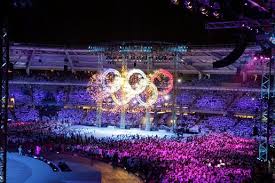By David Owen
April 26 – FIFA is probably going to have to make do with the same size of financial contribution from the Olympic Movement in 2017-20 as it is getting in the present four-year cycle, culminating with the Rio 2016 Olympic and Paralympic Games.
The football body looks set once again to receive $25 million – the same as basketball, cycling, tennis and volleyball – under a new revenue distribution framework outlined last week during the SportAccord convention in the Russian Black Sea resort of Sochi. This would represent no increase at all from the previous Olympic quadrennium. By contrast, the contribution leapt from $14.3 million to $25 million between the Beijing 2008 and London 2012 Games.
The pattern reflects a marked slowdown in the rate of growth of sums raised from Olympic Games broadcasting rights. While rights for the Olympic cycle encompassing Sochi 2014 and Rio 2016 are expected to top $4.1 billion, the rate of increase compared with the $3.85 billion generated over the Vancouver 2010-London 2012 cycle is far slower than the near 50% advance which that last figure represented.
The biggest payment is set, once again, to go to the bedrock Olympic sport of athletics, which is allocated $40 million – $5.2 million less than in the current cycle. The biggest cycle-on-cycle increases, of 28%, have been earmarked for gymnastics and swimming, which will both get $32 million.
The honey-pot that is the World Cup, with its immense revenue-generating capability, means that FIFA is far less dependent on the Olympic Movement money than most other international sports federations.
The cost of the Rio 2016 men’s and women’s Olympic football tournaments has been budgeted by FIFA at $17 million, with the 2018 Youth Olympics in neighbouring Buenos Aires allocated a further $3 million.
Following changes in 2013, the 28 Summer Olympic sports are now split into five groups, labelled A to E, reflecting the magnitude of their respective contributions to the Games; football, part of whose role is usually to enable communities outside the actual host-city to get a slice of Olympic action, is in group B.
Contact the writer of this story at moc.l1745391548labto1745391548ofdlr1745391548owedi1745391548sni@n1745391548ewo.d1745391548ivad1745391548

